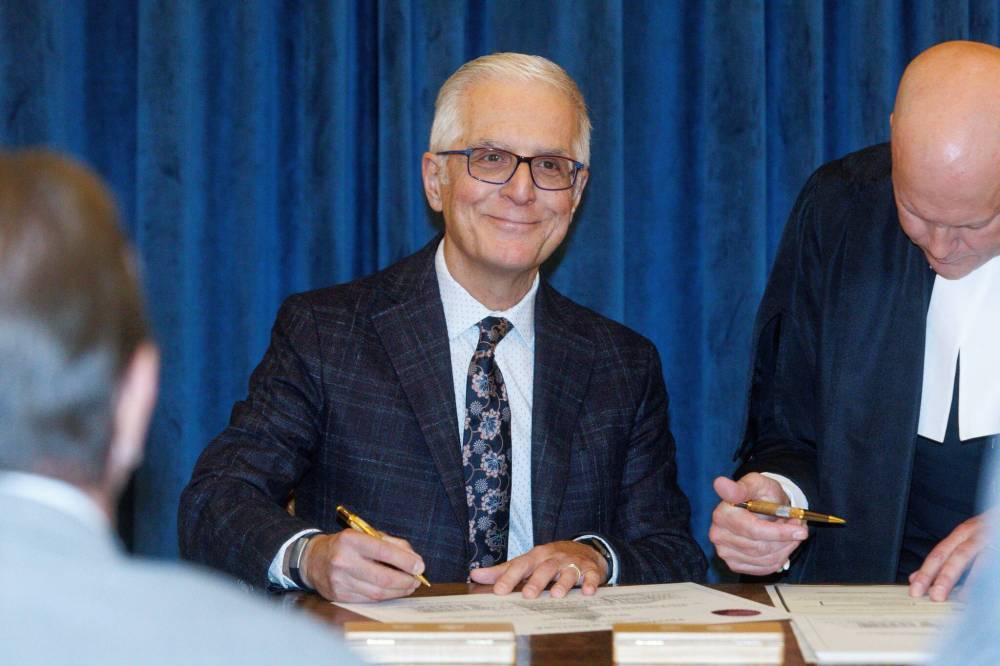A public process to handle teacher misconduct
Advertisement
Read this article for free:
or
Already have an account? Log in here »
To continue reading, please subscribe:
Monthly Digital Subscription
$0 for the first 4 weeks*
- Enjoy unlimited reading on winnipegfreepress.com
- Read the E-Edition, our digital replica newspaper
- Access News Break, our award-winning app
- Play interactive puzzles
*No charge for 4 weeks then price increases to the regular rate of $19.95 plus GST every four weeks. Offer available to new and qualified returning subscribers only. Cancel any time.
Monthly Digital Subscription
$4.99/week*
- Enjoy unlimited reading on winnipegfreepress.com
- Read the E-Edition, our digital replica newspaper
- Access News Break, our award-winning app
- Play interactive puzzles
*Billed as $19.95 plus GST every four weeks. Cancel any time.
To continue reading, please subscribe:
Add Free Press access to your Brandon Sun subscription for only an additional
$1 for the first 4 weeks*
*Your next subscription payment will increase by $1.00 and you will be charged $16.99 plus GST for four weeks. After four weeks, your payment will increase to $23.99 plus GST every four weeks.
Read unlimited articles for free today:
or
Already have an account? Log in here »
Hey there, time traveller!
This article was published 10/01/2024 (734 days ago), so information in it may no longer be current.
Manitobans will soon find out whether an online registry for teachers will be a useful tool to keep track of educators’ disciplinary records, or a repository for “frivolous and malicious complaints,” as the province’s teachers’ union has predicted.
Education Minister Nello Altomare last week confirmed his department plans to implement Bill 35, the Education Administration Act, by January 2025.
The bill, introduced by the former Progressive Conservative government last year, authorizes the creation of an online database of educators that will include information about disciplinary action taken against teachers. It will also see the creation of a new independent commissioner whose responsibility it will be to review complaints against teachers.

MIKE DEAL / WINNIPEG FREE PRESS
Education Minister Nello Altomare
This is long overdue. It’s a process that is already in place for many other professions, including for physicians, nurses and lawyers.
The Manitoba Teachers’ Society (MTS), the union representing the province’s teachers, has been opposed to Bill 35 from the start. It claims safeguards are lacking in the new law to prevent students and parents from making baseless complaints. The union argues neither the registry nor the complaint process will help keep children safe in the classroom.
Those concerns are largely self-serving, designed mostly to maintain the status quo. Under the current system, the union often investigates complaints against its own members. MTS neither maintains a public registry of disciplinary action against its members, nor publishes outcomes of investigations into alleged wrongdoing. It lacks openness and transparency and in many cases, it’s involvement can be a conflict of interest.
By contrast, the new public registry under Bill 35 will allow the public to review information about teachers, including any disciplinary action taken against them. It will give parents and students important insight into the conduct of teachers and hold the small minority of those who breach ethical or professional standards to account.
There is little reason to believe the new complaint process will turn into a witch hunt against teachers, as suggested by MTS. There are multiple layers of safeguards to prevent frivolous and malicious complaints from moving forward. Only legitimate grievances, as determined by an independent commissioner, will be subject to a full investigation.
It will be up to the commissioner to determine whether a public hearing, conducted by a panel of teachers, school board representatives and members of the public, should be held. That will be based on evidence provided to the commissioner.
If wrongdoing is found and disciplinary action taken, that information would be made public on the online registry.
The legislation also gives the province the authority to establish “competence standards” for teachers in order to be certified. This is an important part of the bill that will ensure the teaching profession meets minimum standards.
Bill 35 will help make schools safer for students. It’s why both the NDP, then in opposition, and the former Tory government approved the changes last year.
Like any complaint process, there will likely be some grievances filed against teachers that do not have merit. But far from becoming a dumping ground for frivolous and malicious complaints, the new system is set up to weed out the kind of abuse the teachers’ union has raised as a concern.
No complaint process is perfect. There will likely be changes required along the way to improve the process. It should work effectively as long as the safety of children remains paramount.
And it should also give parents and guardians a larger measure of confidence that the system will properly and publicly address future issues of teacher misconduct.



